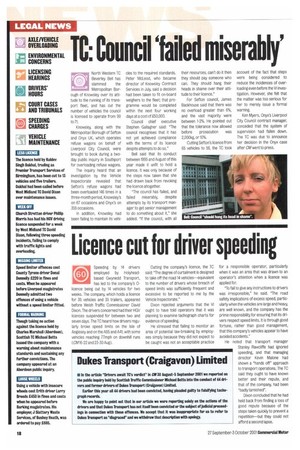Licence cut for driver speeding
Page 18

If you've noticed an error in this article please click here to report it so we can fix it.
Speeding by 14 drivers employed by Holyheadbased Gwynedd Transport, has led to the company's 0 licence being cut by 14 vehicles for two weeks. The company, which holds a licence for 35 vehicles and 35 trailers, appeared before Welsh Traffic Commissioner David Dixon. The drivers concerned had their HGV licences suspended for between two and seven days. The TO heard how drivers regularly broke speed limits on the Isle of Anglesey and on the A55 and A41, with some vehicles reaching 77mph on downhill runs (CM16-22 and 23-30 Aug). Cutting the company's licence, the TC said: "The degree of curtailment is designed to take off the road 14 vehicles—equivalent to the number of drivers whose breach of speed limits was sufficiently frequent and excessive to be reported to me by the Vehicle Inspectorate."
Dixon rejected arguments that the VI ought to have told operators that it was planning to examine tachograph charts for evidence of speeding.
He stressed that failing to monitor an area of potential law-breaking by employees simply because they did not expect to be caught was not an acceptable practice for a responsible operator, particularly when it was an area that was drawn to an operator's attention when a licence was applied for.
"To fail to give any instructions to drivers was irresponsible," he said. "The road safety implications of excess speed, particularly when the vehicles are large and heavy, are well known, and the company has the prime responsibility for ensuring that its drivers respect speed limits. It is through good fortune, rather than good management, that this company's vehicles appear to have avoided accidents."
He noted that transport manager Stanley Rawcliffe had ignored speeding, and that managing director Kevin Malone had shown a 'hands off" approach to transport operations. The TC said they ought to have known better and their repute, and that of the company had been "badly tarnished".
Dixon concluded that he had held back from finding a loss of good repute because of the steps taken quickly to prevent a repetition—but they could not afford a second lapse.




































































































































